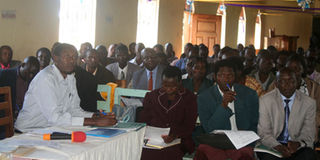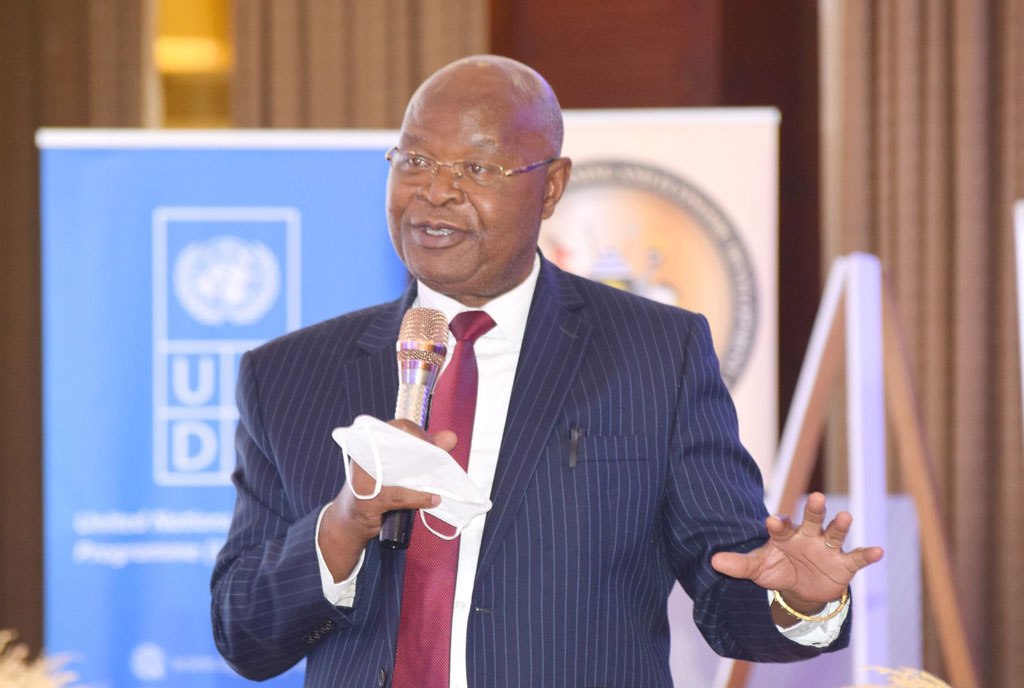Kween District: Infighting cripples education, growth

Kween District officials attend an education conference at Chemwania Church of Uganda to reflect on the district performance in national examinations in May. PHOTO BY PATIENCE AHIMBISIBWE
What you need to know:
Schools in Kween District have for long been underperforming in national exams and district officials now blame it on politicians.
Kween
For three consecutive years, Kween, one of the youngest districts, has been ranked the worst in national examinations in the country. Kween was carved out of Kapchorwa District in 2010.
In last year’s Primary Leaving Examinations, for example, the district performed dismally with 35.5 per cent of the candidates failing to get a pass (certificate). This shambolic performance saw the district ranked last in the country.
Consequently, the district leadership in conjunction with the church met last month to discuss this, and other development challenges in the mountainous district. At the meeting held at Chemania Church Hill, Kween District, it was diagnosed that the district leadership had concentrated on personal political interests and paying little attention to service delivery.
As a result, schools have not been inspected to identify gaps, including absent head teachers, teachers and pupils.
“The low achievement levels, point to deteriorating quality and a lag behind in terms of reading and numeracy which is unacceptable by any standard. The education being universal, pupils are just pushed through,” Mr Lucas Chelangat, the programme manager Sebei Diocese Community Development and Empowerment, said.
“The parents pay nothing, don’t know how the government gets the money, and frankly, don’t care. The education is too focused on passing exams at the expense of crucial life and social skills, things like respect for work and discipline,” he added.
Mr Chelangat says there is overwhelming evidence that learning is scanty and with a pathetic trend for the last three years since the district came into being.
Poor performance
In 2013, out of 2,674 candidates who sat PLE, only 14 made it in Division I and 519 in Division II while 775 passed in Division III. A total of 418 candidates passed in Division IV. Whereas the majority, 914, were in Division U and another 34 were categorised in Division X.
According to Chelangat, this has resulted in a learning crisis. The girl-child is the most marginalised, those in school often do not master the foundational skills, including literacy and numeracy, which would enable them to successfully continue in school.
District officials cite political interference as biggest factor
Sebei Diocesan Bishop Augustine Salimo warned that there is a lot of political interference and this frustrates the work of junior officers.
“In Kween, we should be mourning. How can we become the last? Are we really working for the future? I am bleeding inside. We have had a lot of political wrangles in this district. It is the conflict in the district bringing this poor performance. Some people think it affects only politicians but you see it is also affecting our education,” Bishop Salimo said.
“The teachers are being transferred because of political differences. If we don’t change, this means the ones to do our jobs will not be coming from here. We want leaders to realise that they have been put in these positions for development and they can’t develop if they don’t work together. Let us all do our work to change our region.”
But Mr Patrick Okello, the principal Nyondo Primary Teachers College defended the teachers saying their working condition has been unfavourable. For instance, he explained that some teachers walk a minimum of 8kms every day to school while others have been deleted off the payroll without reason.
Mr Tony Mukasa Lusambu, the assistant commissioner primary education, said most of the district’s challenges are operational and requested the different stakeholders to play their roles for national development.
Joselyn Cherot, the district speaker, admitted that they have been entangled in disputes since they were granted a district status.
“I believe there is a political rift which has hindered development. The people have now started seeing the light and want to refocus their energies on development,” Ms Cherot said.
For the area Woman Member of Parliament, Ms Lydia Chekwel, it has become common practice to switch off her phone when the national examination results are released. She urges that she is always embarrassed when concerned people call her to remind her of the district’s poor performance.
“We have serious issues in Kween. When the results are out, people always call me telling my district has again tailed. All of us are not doing what we are supposed to be doing. We want the next president to come from this region, but will it be possible if we continue to perform like this?” Ms Chekwel said.



